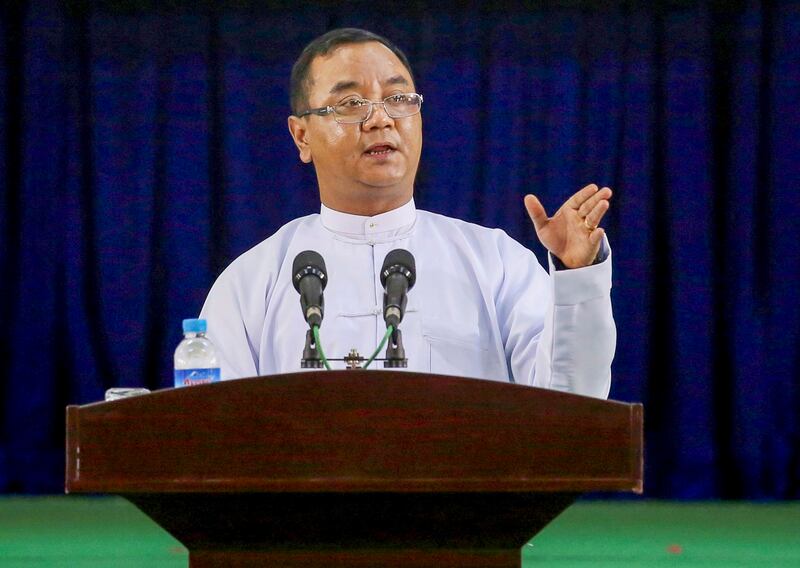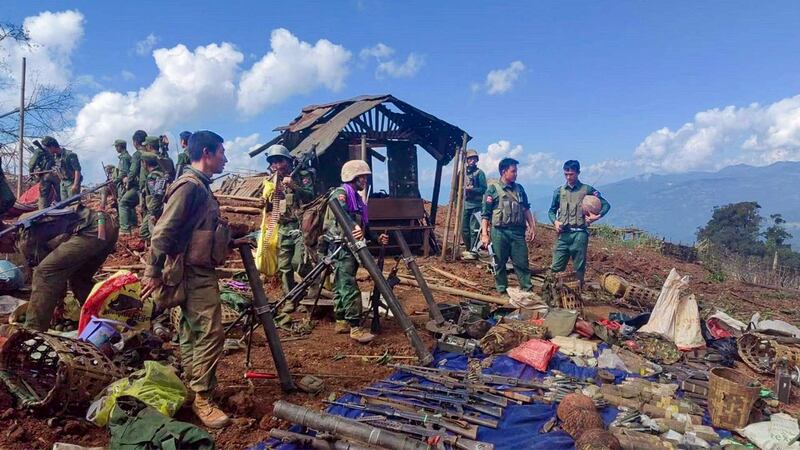A Chinese delegation has traveled to Myanmar in a bid to end the conflict between the junta and the Arakan Army in western Rakhine state, Beijing’s envoy to the United Nations said Thursday, but observers suggest there will be no peace unless the military regime makes significant concessions.
In November, the Arakan Army, or AA, ended a ceasefire agreement with the military that had been in place since the military seized control of Myanmar in a February 2021 coup.
Since then, the ethnic army has dealt junta forces a series of defeats, capturing the Rakhine townships of Pauktaw, Minbya, Mrauk-U, Kyauktaw, Ponnagyun, Myebon, Rathedaung and Ramree, as well as Paletwa township in neighboring Chin state.
Nearly 200 civilians have been killed and more than 500 injured in five months of fighting in Rakhine state, reporting by RFA has found.
Beijing wants to play a “constructive role” in stabilizing the situation in Rakhine state as soon as possible, Geng Shuang, China’s deputy permanent representative to the United Nations, said at a U.N. Security Council briefing in New York. He said a Chinese delegation had arrived in Myanmar, although he provided no details on who was leading the group or who they had met with.
Pro-junta media reports said China’s Special Envoy for Asian Affairs Deng Xijun arrived in Myanmar’s capital Naypyidaw on April 1 and held talks with junta chief Senior Gen. Min Aung Hlaing on border security issues and combating online scam gangs.
China’s ambassador to Myanmar in Yangon, Chen Hai, recently met with former junta chief Than Shwe and other leaders of his military regime, the Chinese Embassy said Friday in a post to its WeChat page.
Chen also met with Than Shwe’s Deputy Vice Senior General Maung Aye and former President Thein Sein, as well as Than Than Nu, the daughter of Myanmar's first Prime Minister U Nu, the embassy said.
Beijing is “working to strengthen the bilateral relationship” as part of efforts to “promote peace and reconciliation in Myanmar,” it said.
China’s motivations?
Beijing is likely motivated by concerns for Chinese development projects in Rakhine state, which include the Kyaukpyu Special Economic Zone, and gas and oil pipelines that cross from Rakhine to China’s Yunnan province, said Pe Than, a veteran Rakhine politician and former lawmaker.
The junta may also have asked China to mediate as it continues to lose ground in the state, he said, but suggested that China doesn’t have enough influence over the AA to end the conflict.
The engagement will only be successful if the AA wins major concessions, he said.
“The key points of negotiation need to mainly focus on the interests and opportunities for Rakhine state, instead of simply giving an order to stop,” he said.

A political commentator and former military officer, who spoke on condition of anonymity due to security concerns, told RFA that Beijing is looking to intervene in the conflict because Myanmar’s development is directly related to China’s interests.
“If Myanmar falls apart … they can’t continue their projects on roads, pipelines and railways,” he said. “Furthermore, they don’t want Myanmar to be ruled by the [shadow] National Unity Government, which is close to the U.S.”
Attempts by RFA to contact AA spokesperson Khaing Thukha for his response to Geng Shuang’s comments went unanswered Friday, as did efforts to reach junta spokesperson Major General Zaw Min Tun and junta Attorney General Hla Thein, who is also the spokesperson for Rakhine state.
Mediation in Shan conflict
In late October, the AA, along with the Ta’ang National Liberation Army, or TNLA, and the Myanmar National Democratic Alliance Army, or MNDAA – together known as the “Three Brotherhood Alliance” – launched an offensive known as “Operation 1027” against the military in northern Shan state, which borders China.
It seized 16 cities before agreeing to a ceasefire in China-brokered talks on Jan. 11.

An ex-military official later said it was not sustainable and less than a week after the agreement, both sides were accused of violating it in a skirmish.
At the end of February, the two sides met again in the Chinese city of Kunming for talks that focused on reopening parts of the border with China that had been shut down during the fighting and preserving the ceasefire.
RFA sent an email to the Chinese Embassy in Yangon requesting comment on China's intervention in the Rakhine state conflict and the Chinese delegation's visit to Myanmar, but had yet to receive a reply as of the time of publishing.
Translated by Aung Naing. Edited by Joshua Lipes and Malcolm Foster.
